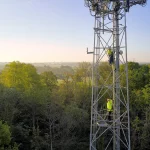BT Nears 2020 Target of Running on 100% Renewable Energy Globally
Telecoms giant BT Group has today signed two new energy deals, primarily on behalf of sibling mobile operator EE, which will mean that 96% of their global operations are now powered by renewable electricity (up from 81% last year).
The new deals effectively reduce BT’s carbon emissions by 100,000 tonnes per year (roughly akin to taking 40,000 petrol cars off UK roads) and mean that EE alone is now powered by 100% certified renewable sources (e.g. wind farms and solar plants). But overall the entire group is still 4% shy of their 2020 target for 100% renewable energy (globally), at least for now.
At the same time the operator has been quick to remind us of its pledge to become a “net zero carbon emission business” by 2045 and in keeping with that they’ve already set a target to reduce emissions by 87% come 2030. At this point it’s worth remembering that BT, as the largest national telecoms and broadband company, buys roughly 1% of the electricity generated in the UK.
Advertisement
Andy Wales, Chief Digital Impact & Sustainability Officer, said:
“The IPCC report showed the urgency of the task we all face to tackle climate change. We recently announced our pledge to become a net zero carbon emission business by 2045, and today’s renewable energy deals mark another important step in reaching our ambitious sustainability goals. We hope that by leading by example we can inspire others to take action and drive the transition to a low carbon economy.”
Last year, BT signed a separate agreement with nPower to supply the rest of EE’s operations, including over 600 retail locations across the UK, with 680GWh of renewable electricity. However it’s important not to forget that other operators, such as Virgin Media and Sky (Sky Broadband), are also highly regarded in terms of their commitment to and adoption of green energy.
UPDATE 29th Nov 2018:
This was originally posted yesterday but BT gave us the wrong embargo date, hence why it vanished and re-appeared today.
Mark is a professional technology writer, IT consultant and computer engineer from Dorset (England), he also founded ISPreview in 1999 and enjoys analysing the latest telecoms and broadband developments. Find me on X (Twitter), Mastodon, Facebook, BlueSky, Threads.net and Linkedin.
« Ofcom UK Impose Cost Cap on Calls to 118 Directory Enquiries
Fears Grow of More Job Losses at UK ISP Origin Broadband »

















































Comments are closed